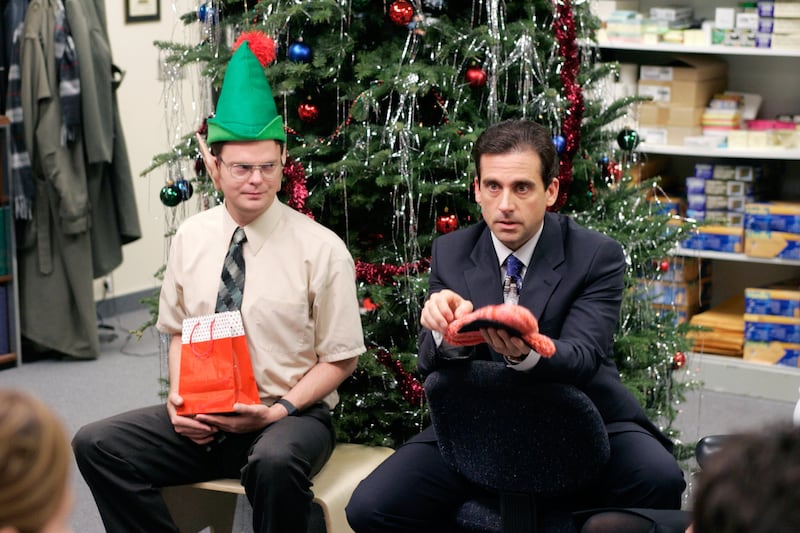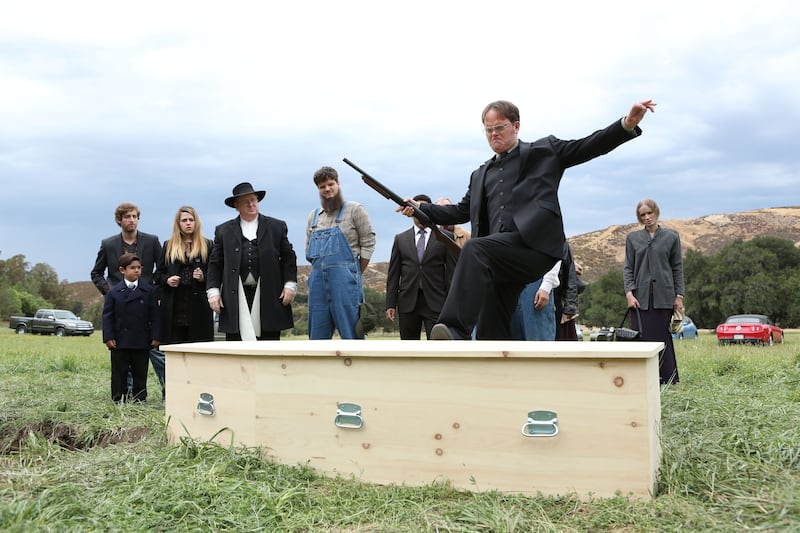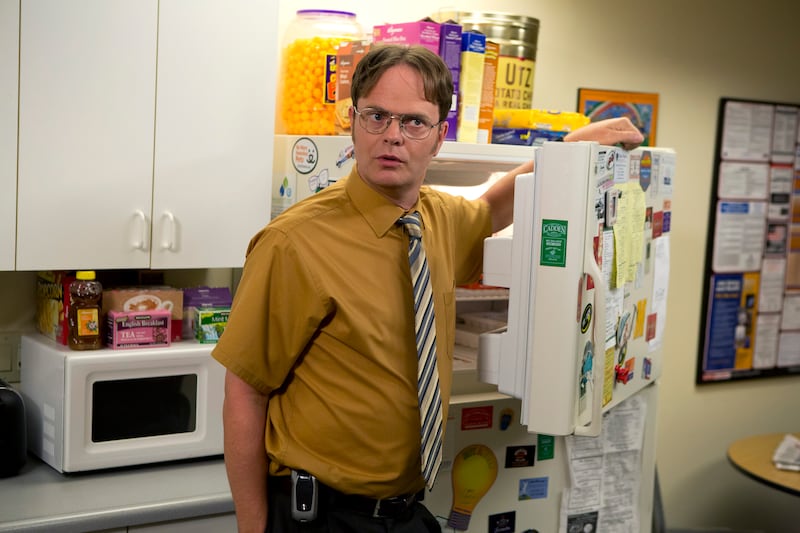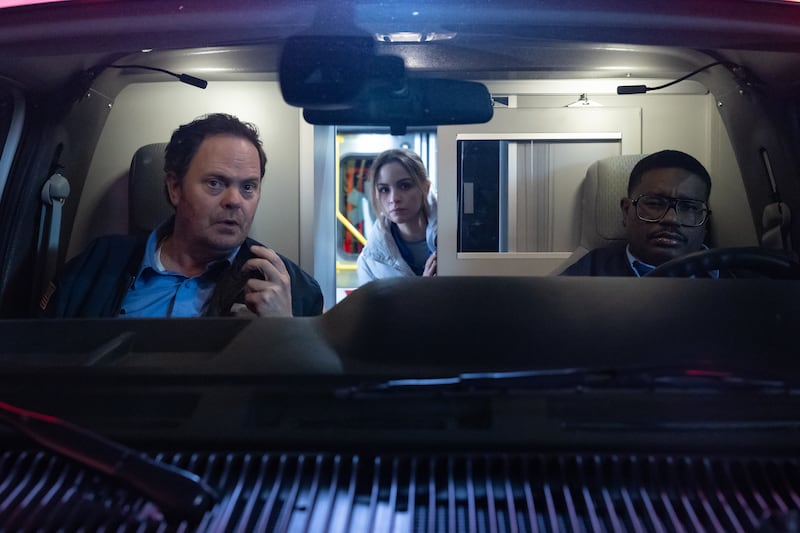When they were shooting the pilot episode of The Office, Steve Carell told Rainn Wilson that playing Dwight Schrute could change his life forever. And he could not have been more right.
In this episode of The Last Laugh podcast, Wilson breaks down his unique career journey from working character actor to sitcom star all the way through his latest film Code 3 (in theaters Friday Sept. 12) in which he plays a burnt out paramedic alongside fellow comedian Lil Rel Howery. His role in the new movie, as well as much of what he has done since The Office ended in 2013, feels very different from Dwight, and purposefully so. Wilson opens up about the massive blessing and occasional curse of being so closely associated with such a popular character.
Then, addressing the perennial question about whether The Office could be made today, he admits that the “clueless, insensitive, racist, sexist” jokes hit differently now. Wilson also reveals the “relief” he felt when NBC killed off a Dwight-centered spinoff and shares whether that character could ever pop up on the new Peacock spinoff The Paper—or perhaps even a movie version of The Office.
From his early days starting out in live theater, Wilson always wanted to be a character actor who could embody any kind of role. Getting hugely famous for playing a very specific paper salesman was an accident. Not that he’s complaining.
But more than a decade after The Office ended, he’s always on the lookout for parts that feel far away from his iconic character. And Randy, the hyper-competent but perpetually exhausted EMS worker on his final shift in Code 3, definitely fit the bill.
Wilson says he was immediately drawn to the script, co-written by a real-life paramedic. “It was funny, it was entertaining, it was hard hitting it. There were scenes I had never seen before,” he explains. “But most importantly, it was about something. It beautifully pulls the veil back and dissects the American healthcare system by really looking at the underbelly of healthcare in the United States on this 24 hour wild ride through the armpit of Los Angeles.”
There was even an ironic nod to Dwight when his character briefly finds himself in a drab office setting towards the end of the film.
“It reminds me of The Hurt Locker where he’s in the grocery store after dismantling bombs,” Wilson says. “That’s like Randy, who’s been saving lives and doing midnight shifts and covered in blood and guts and gore. Then he’s an office drone and he thinks it’s what he wants. He thinks it’s going to make him happy, and we soon learn that he’s a square peg in a round hole for sure.”
During our career-spanning conversation, Wilson looks back on how he went from a working actor with bit parts in movies like Galaxy Quest and Almost Famous to starring in what has perhaps become the most rewatched sitcoms of all time.
He still thinks about those hopeful, or perhaps ominous words from Carell when they making the pilot of The Office. “Steve is the one who said to us, this show could change our lives,” he recalls. “These could be the roles that we are known for till the end of time, no matter what else we do.”
Wilson took it in at the time, but wasn’t convinced. “In my head, I was like, wait, what?” he says. “This little, dumb show? There’s no way this gets on the air. It’s a mockumentary with a bunch of weird looking actors, poorly lit with handheld cameras. This was during the age of Friends. I was like, how is this going to be a television hit?”
Below is an edited excerpt from our conversation. You can listen to the whole thing by following The Last Laugh on Apple Podcasts, Spotify, or wherever you get your podcasts, and be the first to hear new episodes when they are released every Wednesday.
There has been a big conversation over the past several years about whether The Office could be released in the same way today, with the same types of jokes. And I was curious if there was ever a storyline or something in the show that made you uncomfortable or that made you feel like, are we really going to go that far?
Listen you know, the Benihana Christmas episode where Michael and Andy draw with a sharpie on one of the Asian women that they’ve brought back to the Christmas party is jaw droppingly kind of horrific. And it’s a tricky conversation, you know? They’re clueless and in their cluelessness they’re racist and insensitive, and they’re always saying the wrong thing. And that’s Michael, Dwight and Andy—and Kevin for that matter. So it’s a show based around clueless, insensitive, racist, sexist people that kind of mirrors the United States in a lot of ways. So you want to encourage it, because it’s funny as hell, and it also kind of skewers a particular American sensibility, but it definitely goes pretty far if you dig deep. So, you know, could it happen today? I think it would have to be very, very different if it were made in this environment.

I think you even see that in the new spinoff The Paper. The second episode of The Office was “Diversity Day,” which went pretty far. And there’s nothing like that that I can see so far in the new show. To me, I always felt like as long as the show knows that what these people are saying is wrong, then it’s OK. But then you wonder, do the viewers always know that the show knows that?
That’s very well said. It’s pretty complicated. And that’s exactly right. I think you’d need to set it up a little bit more, like All in the Family, where you’ve got someone who has really wrongheaded ideas and they are showcased in a certain way that make it very clear that this person is off base and clinging to ideas from the past. You’d just have to do more underlining of that if you were to make The Office in this present environment. I haven’t seen The Paper yet, so I’m excited to see if they try and push any buttons there.
You’ve also talked about how the show changed after Steve Carell left. I was curious if you ever considered leaving before those nine seasons ended?
Steve and I were in very, very different career situations when he left The Office. He was going off to star in movies that he was getting paid tens of millions of dollars for. And the movies I had tried had bombed, and I didn’t really have a way forward in the film world. So I was absolutely a hundred percent going to stay in The Office as long as I could. And there was an opportunity for Dwight to get to do more, too, with Michael gone. And I did get to do more. I didn’t immediately run the office, but there were different colors you saw from Dwight in those last couple of seasons. We made a few episodes that were pretty mediocre, I would say. I don’t know that we made any stinkers, but there were also some really damn funny episodes in the last couple seasons.
One of those episodes that came towards the end is that final season was called “The Farm,” which was a backdoor pilot for a potential spinoff that would’ve starred you as Dwight, and you potentially would’ve continued playing that character for a long time. I’m sure that there was some disappointment at the time that it didn’t get picked up as a new series, but was there any relief along with that as well?
Yeah, what we kept talking about was Frasier and Cheers and one could argue that Frasier’s a better show than Cheers. Kelsey Grammar took kind of a minor character on Cheers and made him a really memorable comedic lead that’s in the annals of great TV characters. But I have to say that you’re absolutely right, you’re very astute. It was like 10 to 20% disappointment and like 80% giant relief.

Oh wow, I thought it was maybe more like 50-50.
No, no, it was a big relief of like, OK, good, I’m not going to do many more seasons of Dwight. And especially because NBC at that time had a new regime that came in and they wanted to do big, bright, flashy, splashy shows that were multi-cams and going back to Friends kind of thing. And they were just not interested at all in Office spinoffs at the time. Had they taken The Farm, they’d probably have another billion dollars in the bank. Even now, all the people that have seen The Office 20 times, they’re going to watch The Farm at least once or twice. Would it have been as good as The Office? No. No way. Not even close. Would it have been good? Would it have been solid? Would it have been a good solid comedy? Yeah, it would have, and we would’ve done some really cool stuff. And I think they really missed out. But the the history of The Office in NBC is, they never really got the show. Honestly, it was like five years after the show was over, when all of a sudden it started being watched in the billions of minutes on Netflix, that NBC was like, wait a minute, this is kind of a cash cow. This is actually a really good show and it’s got some legs.
It’s funny, with actors on big shows like this, you often think about how your life changed when the show took off. But for you, it’s almost like, how did your life change when the show took off again?
Yeah, it was pretty nuts because starting around Season 2 and 3 of The Office, the show took off like gangbusters. We won the Emmy, we all got a bunch of different movies. I did The Rocker and My Super Ex-Girlfriend and a lot of movies got offered to me because of the success of The Office. I got to host SNL. It was amazing. And multiple Emmy nominations, which I never won, Thank you, Jeremy Piven, enjoy your Emmys.
Jeremy Piven, that hurts.
And then people don’t remember but the last four or five seasons of The Office, it really dwindled. Our ratings were going down, we didn’t win awards anymore. Steve never won an award, which is nuts. Alec Baldwin won, like, nine Golden Globes and Emmys and SAG awards, and, and Steve was kind of left out in the cold. And then no one was really watching The Office, we kind of petered out. And there were several years where we all kind of thought, OK, that’s great, it’ll be on syndication, people will watch it, we had a great run. And then all of a sudden, about four or five years after The Office ended, I was getting recognized more than ever, and by 10 year olds and 12 year olds and 14 year olds. It was like, what is going on? Oh, it’s on Netflix. People are watching it over and over and over again and getting to the end of Episode 200 and starting over from the very beginning and leaving it on, sleeping with it. And it became a very different thing. It’s fantastic. What can I say? It’s had so many different lives.

We just had Beck Bennett from SNL on this podcast, and he said something like, once you’re an SNL cast member, you’re always an SNL cast member, that’s what you are always going to be known for. And it reminded me of The Office, too. You will always be Dwight from The Office, as Steve predicted. And there are pros and cons to that, right? Does it open as many doors as it puts you in a box, or is there a balance there?
It’s a really tricky balance. And I wrestle with it a good amount. So many doors opened for me because I played Dwight. I can go to Wimbledon or I get a commercial campaign. Or I can do an appearance or a conference at Comic-Con and do signings and make money. I am, in a lot of ways, set for life because I played Dwight, which is incredible, and it’s beyond my wildest dreams from this dorky theater actor in New York, never making over 17 grand a year as an actor. It’s insane, it’s amazing. But the role is so iconic, and his face is one of the most meme’d things—it’s in the billions that my face is being sent to text chains.
You didn’t know when you were filming those scenes that that’s where you were going to end up.
Exactly. Or that if you walk into a Target, you’re going to see me on tea towels and bath mats.
Do you have a piece of that?
I have a tiny, tiny piece of that—that’s what she said. Had I known, I would’ve negotiated much harder on my merch deal. But at the same time, I’m a transformational actor. There are some actors, like let’s say Michael Richards who played Kramer, that’s kind of what he does. Nothing against him, he is absolutely brilliant, but he comes at it from a stand-up, improv kind of background. And I was doing Shakespeare and Eugene O’Neill. I can play roles other than Dwight, as evidenced, I hope, in Code 3.

I was not thinking about Dwight watching that movie at all, which I think is what you want, right?
Yeah, that is what I want. So, I just hope too, especially as I age and look more different than Dwight, that there’s a realm of roles that are open to me just as a character actor, which is what I wanted to do from the get go, is just play interesting characters and tell interesting stories. So it’s tricky, because I’m so identified with a guy that is on countless coffee mugs, but I hope that producers and filmmakers will be open to seeing me as a good solid character actor.
Well, on the other hand, Oscar Nuñez, your old co-star, is in this new show The Paper, which sort of opens the door to other Office cast members reprising their roles. Could you imagine bringing Dwight back in that setting?
I don’t think so. I mean, The Paper’s set in Toledo and it’s a newspaper. I don’t know why Dwight from Lackawanna County would be visiting Toledo.
I’m sure they could come up with a reason.
You’re right, you’re right, never say never, that could certainly happen. And yeah, I think it would be fun. I mean, one thing I’ve always said to them is, can we do a movie? Wouldn’t that be fun to do a two-hour movie? We could get like a billion people to watch a two-hour Office movie!
Is there any interest or traction on that?
The producers, Greg Daniels, they just don’t really think in those terms. They think of it financially, like a movie will make X amount of dollars, it’ll be on a streamer, it’s a lot of work. It’s much more lucrative to have a show that goes year after year after year. But I think that would be a lot of fun and I think you could get most of the main cast to participate.
Listen to the episode now and follow The Last Laugh on Apple Podcasts, Spotify, or wherever you get your podcasts to be the first to hear new episodes when they are released every Wednesday.
The post Rainn Wilson: ‘The Office’ Could Be ‘Jaw-Droppingly’ Offensive appeared first on The Daily Beast.




